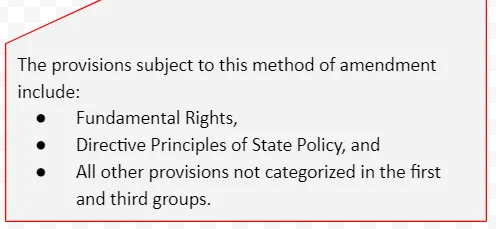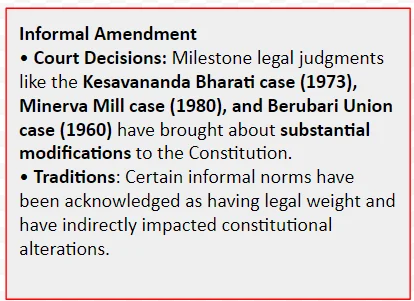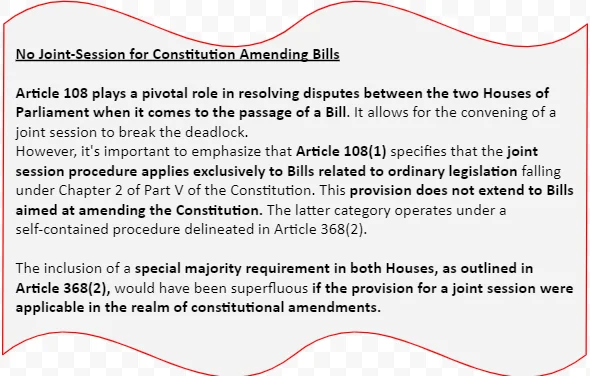The Indian Constitution provides several methods for amendments, each requiring different levels of parliamentary and state involvement. Amendments can be made by a simple majority or a special majority of Parliament, and in some cases, require consent from half the state legislatures. This system balances the need for flexibility with constitutional stability.
Amendment Procedure of Indian Constitution
Amendments by a Simple Majority of Parliament
- Amendments by a Simple Majority of Parliament (more than 50% of the member present and voting , also called functional or executive majority) encompass various provisions within the Constitution, including:
- Admission or establishment of new states.
- Formation of new states and modifications to the boundaries, names, or areas of existing states.
- Creation or abolition of legislative councils within states.
- Emoluments, allowances, privileges, and related matters of the president, governors, Speakers, judges, etc., as detailed in the Second Schedule.
- Quorum requirements within Parliament.
- Salaries and allowances for members of Parliament.
- Parliamentary rules of procedure.
- Privileges of Parliament, its members, and its committees.
- The use of the English language in Parliament.
- Determination of the number of puisne judges in the Supreme Court.
- Expanding the jurisdiction of the Supreme Court.
- Official language usage.
- Matters related to citizenship, including acquisition and termination.
- Electoral processes for Parliament and state legislatures.
- Delimitation of constituencies.
- Governance of Union Territories.
- Administration of scheduled areas and scheduled tribes as per the Fifth Schedule.
- Administration of tribal areas under the Sixth Schedule.
Enroll now for UPSC Online Course
Amendments by a Special Majority of Parliament [Article 368(2)]
- Requirements for Special Majority Amendments: Special majority amendments require the majority of the total membership of each House, with a majority of two-thirds majority of members present and voting.

-
- Each House must pass the bill separately.
- Definition of Total Membership: The term “total membership” refers to the complete membership of the House, regardless of vacancies or absent members.
- Application of Special Majority: While the special majority requirement is typically reserved for the third reading stage of the bill, the rules of the Houses mandate this special majority for all significant stages of the bill.
Amendments by a Special Majority of Parliament and Consent of States (Article 368(2))
- Requirements: Amendments under Article 368(2) pertain to provisions related to the federal structure of the Constitution.
- These amendments require a special majority in Parliament and the consent of at least half of the state legislatures via a simple majority.

- State Inaction and Amendment Process: It is worth noting that if certain states take no action on the bill, it does not impede the process.
- Once half of the states grant their consent, the formalities are fulfilled.
- No specific time frame is set for states to provide their consent for the bill.
- Provisions Amendable Under This Method Encompass:
-
- The election of the President and the procedure for such elections.
- The scope of executive authority for both the Union and the states.
- Matters concerning the Supreme Court and High courts.
- Allocation of legislative powers between the Union and the states (i.e. amendment of the Seventh Schedule).
- The Goods and Services Tax Council.
- Any of the lists outlined in the Seventh Schedule.
- Representation of states in Parliament.
- Parliament’s authority to amend the Constitution and the procedure for doing so, as laid out in Article 368 itself.
General Features of the Amending Procedure
Distinctive Features of the Amending Process: The amending process prescribed by our Constitution possesses certain distinctive features when compared to leading Constitutions around the world.
- This procedure, often classified as “rigid,” demands a special majority and, in some instances, a unique amendment process, as opposed to the procedure for ordinary legislation.
- However, it’s worth noting that the amending procedure is not as intricate or challenging as those found in the USA or other rigid Constitutions.

- Constitutional Amendment Power Vested in Parliament: Subject to the special procedure outlined in Article 368, our Constitution entrusts the constituent power to the Parliament.
- This, of course, requires acting with a special majority.
- Notably, there is no separate body established solely for amending the Constitution, as is the case in some other Constitutions, such as a Constitutional Convention.
- Exclusive Role of Union Parliament: The State Legislatures do not possess the authority to initiate any Bill or proposal for the amendment of the Constitution.
- The sole method for initiating such a proposal is by introducing a Bill in either House of the Union Parliament.
- Treatment of Constitution Amendment Bills: Constitution Amendment Bills, except for the provisions in Article 368, are to be passed by Parliament just like ordinary Bills.
- Constitution Amendment Bills can be introduced either by a minister or by a private member.
- Prior Approval Of The President: is not a prerequisite for the introduction of any Constitution Amendment Bill in Parliament.
- Ratification Requirements Compared to the American Constitution: Comparing the requirement for ratification by State Legislatures with the corresponding provisions in the American Constitution, the stance of the Indian Constitution is more lenient.
- While the American Constitution mandates ratification by no less than three-fourths of the States, our Constitution only necessitates ratification by at least half of them.
- Presidential Assent for Constitutional Amendments: For an ordinary Bill governed by Article 111 (Assent to Bills), once it is passed by both Houses of Parliament and is presented to the President, he has the option to either give his assent or declare that he “withholds assent”.
- In the latter scenario, the Bill cannot become an “Act”.
- However, the 1971 amendment of Article 368 has made it mandatory for the President to grant his assent to a Constitution Amendment Bill when it is presented to him after being passed by the Legislature.

Criticism of the Constitutional Amendments
Critics have raised concerns about how the Constitution can be changed. They say:
- Parliament’s Exclusive Role: Only Parliament can suggest changes to the Constitution, except in one case when state legislatures can ask for legislative councils to be created or abolished.
- State Consent in Amendments: Most of the Constitution can be changed by Parliament alone, with either a special majority or a simple majority.
- In a few cases, the consent of state legislatures is needed, but only half of them.
- The Constitution doesn’t specify how quickly state legislatures should agree or disagree with an amendment.
- It also doesn’t say if states can change their minds after giving approval.
- Resolution of Deadlocks Between Houses: There’s no way to resolve a deadlock between both houses of Parliament if they can’t agree on a Constitutional amendment.
- Similarity to Regular Legislative Processes: The process for amending the Constitution is quite similar to making regular laws, except for needing a special majority.
Enroll now for UPSC Online Course
- Absence of a Special Body: There is no provision for a special body to change the Constitution, such as a Constitutional Convention (as in the United States) or a Constitutional Assembly.
| Must Read | |
| Current Affairs | Editorial Analysis |
| Upsc Notes | Upsc Blogs |
| NCERT Notes | Free Main Answer Writing |
Conclusion
Despite its flaws, it’s evident that the process has been straightforward and effective in adapting to changing needs. This procedure strikes a balance between flexibility and rigidity, as K.C. Wheare rightly pointed out. According to Granville Austin, although it may seem complex, the amending process is one of the well-thought-out aspects of the Constitution.
Sign up for the PWOnlyIAS Online Course by Physics Wallah and start your journey to IAS success today!
| Related Articles | |
| The Role and Status of Legislative Council | Types of Majorities in Parliamentary Decision-Making |
| Supreme Court | Constitution: A Living Document |

 GS Foundation
GS Foundation Optional Course
Optional Course Combo Courses
Combo Courses Degree Program
Degree Program










